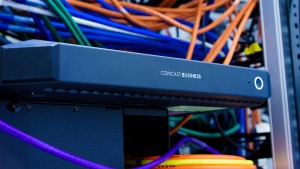Best Practices for Small Businesses to Combat Cybersecurity Threats
By Jeff Marston, Vice President Comcast Business
Cybersecurity attacks have become a destructive and all too common occurrence. And the harsh reality is that no organization is too large – or too small – to be a target.
While cyberattacks facing large corporations and government entities may dominate headlines, small businesses are victim to the majority of cybersecurity breaches. In fact, nearly half of small businesses in the United States suffered a cyberattack in 2017, according to a recent study.
Cybersecurity attacks are constantly evolving to accommodate the latest technologies. Small businesses contend with several existing and emerging internet-related threats, including malware, ransomware, phishing and botnet infections.
Faced with increased competition and restricted resources, it is easy to imagine the daunting challenge small businesses face to defend themselves from nefarious cyber actors. But as the threat landscape becomes increasingly sophisticated and prevalent, small businesses cannot afford inaction.
Small Business’ Path to Cyber Safety
For businesses large and small it’s less about “if” a breach will happen and more about “when” it will happen. That’s why it’s best to invest in protection and prevention before a crippling attack occurs. According to security firm Kaspersky, the average cost of a breach in North America is $149,000. Just as damaging, the loss in public trust and reputation can be irreparable.
Cybersecurity keeps business owners up at night because they face an onslaught of challenges, from various, ever-changing forms of cyberthreats that can result in the loss of sensitive information or the disruption of business operations. When it comes to defending against cybersecurity threats, owners need solutions that can protect all devices connected to their networks without straining budgets.
In the past, cybersecurity tools were developed to suit the needs of larger companies, which have the money and resources available to deploy complex solutions and continually enhance security networks. Now, many small businesses are turning to cloud-based internet security solutions that are engineered to help them effectively manage the growing risk of cyberattacks while maximizing resources without compromising security.
In many cases, small businesses have already established a digital infrastructure but lack the bandwidth to expand it further. Using cybersecurity technology that can be built into existing hardware offers these businesses an all-in-one solution that requires no additional investments in equipment or setup. To further maximize their cybersecurity investments, small businesses can look for tools that automatically cover all connected devices on their networks, from mobile phones to wireless printers, without requiring new software installations.
Comprehensive cybersecurity solutions shouldn’t just protect small businesses against external breaches – tools that block access to compromised or malicious domains can help prevent business owners, employees, or guests from accidentally accessing an infected internet site. Businesses with little to no IT support can also look for tools with dashboards and features that can be customized based on their needs. For example, a tool that allows owners to filter web content will give them more visibility into their network safety.
The ability to gather insights from cybersecurity solutions is critical, but sometimes there is not enough time in a fast-paced work day to pull a threat assessment. Tools that automatically update internet domain threats in real-time can protect companies from attacks without needing manual downloads or updates. Your business works hard to carve out a competitive space – your cybersecurity tools should be a hassle-free addition to the workplace.
To learn more about Comcast Business security solutions, please visit: www.comcastbusiness.com/securityedge


